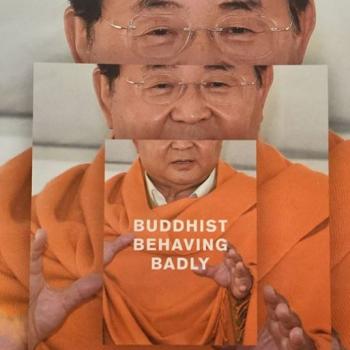A Guest-post By Tom Clements
When I first discovered Buddhism, I was severely depressed and was looking for a way out of the squalid depths of misery and despair an illness like depression inflicts on an individual. Following the dharmic path enabled me to become more altruistic, compassionate and made falling into destructive patterns of routine self-absorption impossible. When you delight in making others happy and shift your focus to others, it really is difficult to be bitter and cynical. Hatred turns to love and pain dissolves into happiness. If it weren’t for my discovery of Buddhist psychology in particular, I doubt I would be alive today.
However, I discovered a problem later on in my practice which began to trouble me and caused me to temporarily lapse back into a negative mind-set. Many Buddhists I began talking to and affiliating with struck me as so devout, so attached to Buddhism itself as to appear wrapped up in their own self-image, wearing Buddhism almost as a fashion statement and idolising the dharma as an enlightened lifestyle above all others. This very egocentric attachment to Buddhism is problematic and a trap that many people seeking enlightened lifestyles, especially those from a Western background, fall into. Chogyam Trungpa points these dangers out in his classic book “Cutting Through Spiritual Materialism” as does the Dalai Lama frequently in his speeches to foreign audiences whom he warns to guard against being attracted by the exotic patina of Eastern disciplines.
Another issue trap I fell into was to hoarde Buddhist literature and to greedily devour books on the subject to the point that the original dharmic ethos of restraint and generosity was lost on me. I was consuming so much information on the subject that I began to lose the simple compassion that is so vital to Buddhist practice. I’d spend my evenings trying to get my ahead around impenetrable and arcane ideas in Zen and Dzogchen that I lost the time I could have spent volunteering or doing charity work. My own depression actually returned slightly as soon as I became to agonise over the finer points of the dharma and how to reconcile certain concepts with my own secular Western worldview. Eventually, I gave up, let go and decided that reading about too much into Buddhism is in and of itself problematic and vain. Now instead of reading heavy-going and esoteric literature on the subject or as soon as I begin to think too much about what can be a very esoteric discipline, I feed the birds, I make my grandmother tea, I tidy my room or I spend time preparing a simple meal, remaining mindful of what I am doing the entire time. Whenever my mind strays, or I begin to feel anxious about reconciling elements of living an Eastern way of life in a Western environment, I focus on everything outside of me and realise how much I have to give to this world. The hungry birds need my kindness, my grandmother reciprocates the generosity I show her and the earth says thank you when I recycle my cans.
In reality, I often see more altruism in those who grind through reality without ever pursuing a spiritual path than those who obsess over it. The smiling and stoical Afghan shopkeeper in my shop for example, is in many ways a better Buddhist than those who meditate and chant mantras every day. The not-especially-bright but sweet-natured young man who works at the station helping disabled customers onto the train is a far better Buddhist than me. In fact, being “Buddhist” is nothing if it means you aren’t contributing to the wellbeing of others. It’s a vain and problematic label with no inherent meaning if you wear it as fashion statement, you over-intellectualise it or you boast about it on Twitter.
The dharma must never be removed from completely plain and ordinary everyday experience. When someone the other day asked me what Buddhist rituals I do, I replied to them “I make tea for my grandmother.”
Tom Clements is a 28-year-old teacher from Bishop’s Stortford, UK. He was diagnosed with Asperger Syndrome 5 years ago and is now an advocate of the neurodiversity movement. He is looking to find a publisher for his memoir ‘The Autistic Buddha: An Unconventional Path to Enlightenment’.












